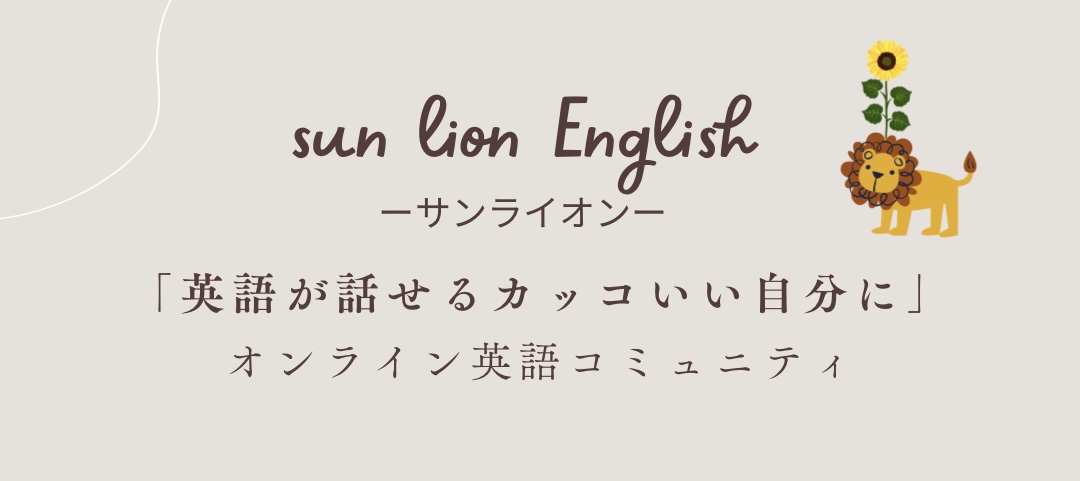2026年 月 日( )
会場
zoom
クラス内容
Today’s Takeaway✨

単語・フレーズ


2026年2月24日(火)
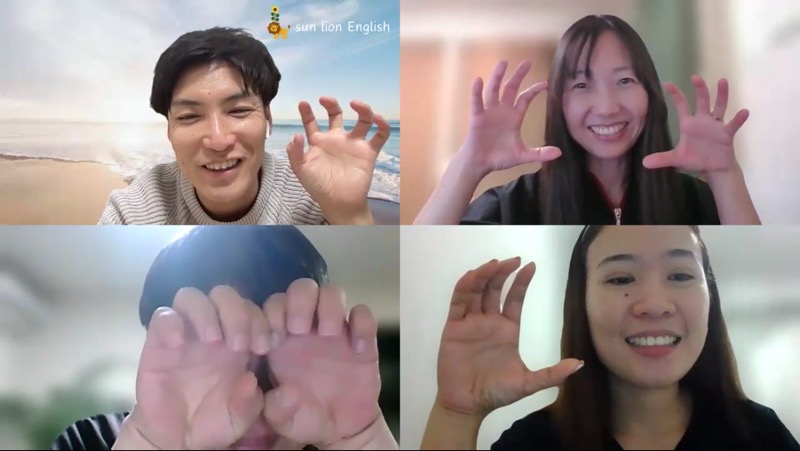
会場
zoom
クラス内容
「日記でディスカッション🥳」
Today’s Takeaway✨

生きた英語は、教科書より人から学べる。
単語・フレーズ

🌟 Review — Expressing Deep Feelings
Key Phrase:
It makes you think deeply.
(深く考えさせられます)
ポイント
・deeply は「深く」という“感情や思考の深さ”を表す副詞
・serious や a lot よりも知的なニュアンスになる
・映画・本・アニメの感想でとても使える表現
Example
- This movie made me think deeply about justice.
(この映画は「正義」について深く考えさせられました。)

🌟 Review — Highlighting What Touched You Most
Key Phrase:
Especially, I felt the fear of justice.
(特に「正義」の怖さを感じました)
ポイント
・especially は「特に・とりわけ」と強調できる便利ワード
・全体の感想 → especially で一番伝えたい部分を言うと自然
・レビューが一段と具体的になる
Example
- I enjoyed the story, but I especially liked the ending.
(物語も良かったですが、特にラストが印象的でした。)
2026年2月17日(火)

会場
zoom
クラス内容
「tell me about you☺️」
Today’s Takeaway✨

英語は「知識」より「人とつながるツール」
話してみることで、
英語はちゃんと通じるし、
コミュニティだからこそ安心して使える✨
単語・フレーズ

🌟 Review — Simple Weekend Updates
Key Phrase:
I feel better.
(気分が良いです)
ポイント
・短くて感情が伝わる超便利フレーズ
・掃除・運動・リラックス後など、日常の変化にすぐ使える
・前の行動(cleaned my room)とセットで使うと自然
Example
- I cleaned my room last Sunday, so I feel better now.
(先週の日曜日に部屋を掃除したので、今は気分がいいです。)
2026年2月10日(火)
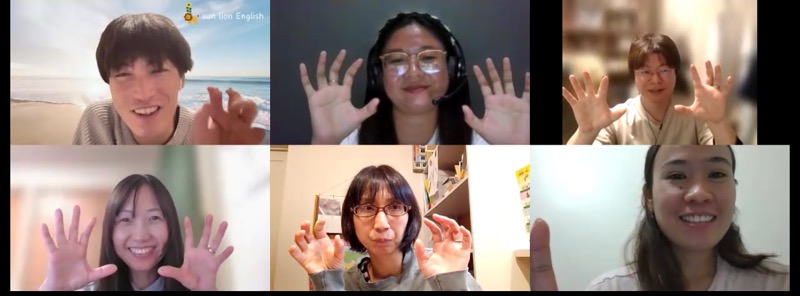
会場
zoom
クラス内容
「クイズでディスカッション👑」
Today’s Takeaway✨

“This community is about sharing who you are.”
(このコミュニティは、英語力より「あなた」をシェアする場所。)
単語・フレーズ

🌟 Review — Giving Hints in a Quiz
Key Phrase:
It is made by bees from flower nectar.
(花の蜜からミツバチによって作られます)
ポイント
・「It is 〜」を重ねることで、シンプルでも伝わる英語になる
・ヒント形式は語彙力より“説明力”が鍛えられる
・答えを言わずに特徴を伝える練習にぴったり
Example
- It is very sweet and delicious on bread.
(とても甘くて、パンにつけるとおいしいです。)

🌟 Review — Reading Big Numbers Naturally
Key Phrase:
I have 240,000 subscribers and 400 million views.
(登録者24万人、再生回数4億回です)
ポイント
・3ケタごとのカンマで区切って読む
・240,000 → two hundred forty thousand
・400,000,000 → four hundred million
・日本語の「万」は使わず、thousand / million を使う
Example
- My video has over 1.2 million views.
(私の動画は120万回以上再生されています。)
2026年2月3日(火)

会場
zoom
クラス内容
「Japanを教えて🇯🇵」
Today’s Takeaway✨

日本文化は
「行事の説明+自分の一言」を足すと、会話が一気に広がる✨
単語・フレーズ

🌟 Review — Setsubun & Ehomaki
Key Phrase:
You face a lucky direction and eat the whole roll in silence.
(縁起の良い方角を向いて、黙って一本丸ごと食べます)
ポイント
・日本文化を英語で説明するときにとても使いやすい内容
・動作を「and」でつなげると、流れが自然になる
・海外の人が「それ何?」と興味を持ちやすいテーマ
Example
- For Setsubun, we eat Ehomaki while facing the lucky direction of the year.
(節分には、その年の恵方を向いて恵方巻きを食べます。)

🌟 Review — Talking about a Japanese Toy
Key Phrase:
My children are really into this toy.
(子どもたちはこのおもちゃにハマっています)
ポイント
・「be into 〜」は“ハマっている”を自然に表せる便利フレーズ
・シンプルな説明でも、特徴を順に言うと伝わりやすい
・子ども・趣味の話題は会話が広がりやすいテーマ
Example
- It’s a Japanese toy, and it spins very fast.
(日本のおもちゃで、とても速く回ります。)

🌟 Review — Talking about Setsubun
Key Phrase:
We throw beans to drive away bad luck.
(悪い運を追い払うために豆をまきます)
ポイント
・日本文化をシンプルに説明できる定番フレーズ
・「to drive away 〜」で意味(厄払い)が伝わりやすい
・行事+自分の感想を入れると一気に会話向きになる
Example
- On Setsubun, people throw beans to drive away bad luck and wish for good health.
(節分では、豆をまいて厄を払い、健康を願います。)
2026年1月27日(火)

会場
zoom
クラス内容
「日記でディスカッション🥳」
Today’s Takeaway✨

英語は“正しい単語”より、「どう説明するか」でちゃんと伝わる
単語・フレーズ

🌟 Review
日本・オーストラリア・フィリピンと、国を越えて英語と日本語を行き来しながら、
天気や食べ物、日常の話題で自然に会話が広がった✨
「卵かけご飯って英語でなんて言うの?」など、
正解を探すというより、伝えようとする姿勢そのものが会話になると改めて感じる時間。
2026年1月24日(土)
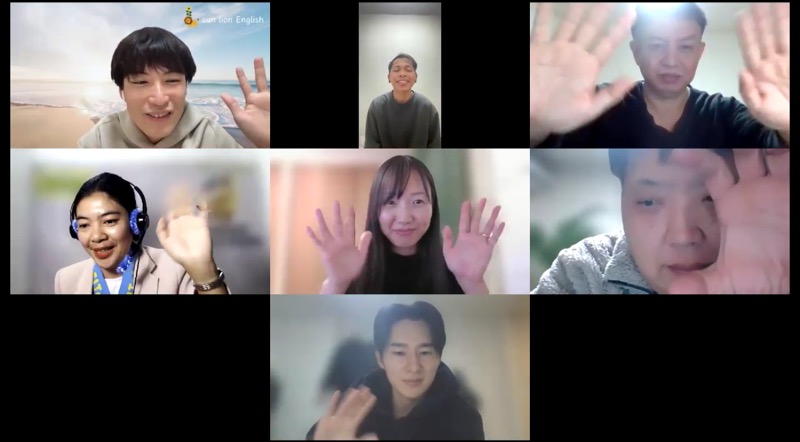
会場
zoom
クラス内容
「日記でディスカッション🥳」
Today’s Takeaway✨

身近な話題(天気・自然)は、
正解より「共感」で会話が広がる
単語・フレーズ

🌟 Review — Talking about Cold Weather
Key Phrase:
It’s very hard to wake up in the morning.
(朝起きるのがとても大変です)
ポイント
・寒い季節の雑談でそのまま使える定番フレーズ
・「It’s hard to 〜」は日常会話で超よく使う形
・天気の話から体調・生活リズムの話につなげやすい
Example
- It’s very hard to wake up in the morning when it’s cold.
(寒いと、朝起きるのが本当に大変です。)
2026年1月20日(火)
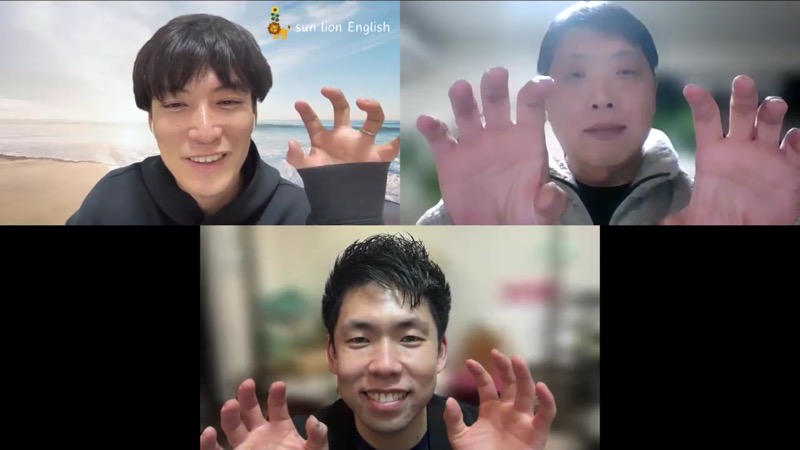
会場
zoom
クラス内容
「tell me about you☺️」
Today’s Takeaway✨

英語は「説明する」より、
一言フレーズで自分を表すと自然になる

英語も行動も、
「考えすぎる前に口に出してみる」
単語・フレーズ

🌟 Review — The Secret to Gardening Success
Key Phrase:
I have a green thumb.
(私は園芸の才能があります。)
ポイント
・「植物を育てるのが上手な人」を意味するイディオム
・直訳の「緑の親指」から意味を推測しにくい
・趣味や特技を紹介する際に、ネイティブらしい表現として使える
Example
- My room is full of plants. I guess I have a green thumb.
(私の部屋は植物でいっぱいです。どうやら私は園芸の才能があるようです。)

🌟 Review — Asking About Interests Naturally
Key Phrase:
What are you into?
(最近、何に夢中ですか? / 趣味は何ですか?)
ポイント
・相手の興味や関心を聞く際の、非常に自然でカジュアルな表現
・“What is your hobby?” よりも頻繁に使われる
・into の後には名詞または動名詞(-ing形)が続く
Example
- A: What are you into these days? B: I’m into learning business strategies.
(A: 最近、何に夢中ですか? B: ビジネス戦略を学ぶことに夢中です。)

🌟 Review — The Business Mindset
Key Phrase:
Don’t think, just move.
(考えるな、ただ動け。)
ポイント
・新しい挑戦やビジネスを始める際の「即断即決」のマインドセット
・行動を促す、力強い決意表明やアドバイスとして使える
・Act fast(迅速に行動する)と言い換え可能
Example
- If you want to start a new business, don’t think, just move.
(新しいビジネスを始めたいなら、考えるな、ただ動け。)
2026年1月14日(火)
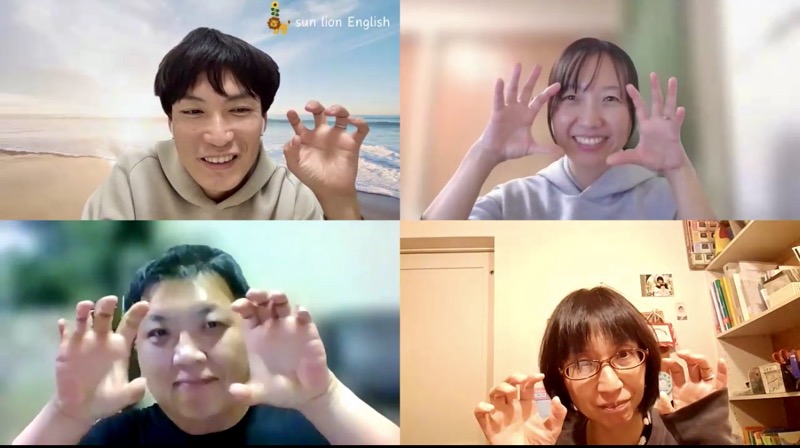
会場
zoom
クラス内容
「日記でディスカッション🥳」
Today’s Takeaway✨

英語は「正解探し」より、楽しく訳してみる✨

昔聞いた日本語を英語で聞いたり、新しい単語に出会えた👍

・毎週(火)は、セブンイレブンに新商品が並ぶ🍙
単語・フレーズ

🌟 Review — Small but Fun Facts
Key Phrase:
You really ought to go every Tuesday.
(毎週火曜日に行くべきだよ)
ポイント
・ought to は「〜したほうがいい」という軽いおすすめ表現
・命令っぽくならず、雑談や小ネタにぴったり
・日常のちょっとした発見を共有するときに使える
Example
- New products come out at Seven-Eleven every Tuesday, so you really ought to go then.
(セブンイレブンは毎週火曜日に新商品が出るから、その日に行くといいよ。)

🌟 Review — Unexpected Daily Events
Key Phrase:
I was really surprised!
(本当にびっくりしました!)
ポイント
・シンプルで感情がそのまま伝わる便利フレーズ
・予想外の出来事・ハプニングに幅広く使える
・日記・雑談・スモールトークに最適
Example
- I had a nosebleed after sneezing, and I was really surprised!
(くしゃみをしたら鼻血が出て、本当にびっくりしました!)

🌟 Review — Unexpected Trouble at Work
Key Phrase:
I was shocked.
(びっくりしました)
ポイント
・仕事中や日常のハプニングにそのまま使える
・ネガティブすぎず、驚きをシンプルに表現できる
・後ろに理由をつけて話を広げやすい
Example
- I was shocked when water suddenly came out of the shower on the ceiling.
(天井のシャワーから急に水が出てきて、びっくりしました。)
2026年1月6日(火)

会場
zoom
クラス内容
「Japanを教えて🇯🇵」
Today’s Takeaway✨

知ってるつもりでも、英語にすると新しい発見

英語を通して、日本の文化も学べた(黒豆の意味🇯🇵)
単語・フレーズ

Key Phrase:
Each dish has an auspicious meaning.
(それぞれの料理に縁起の良い意味があります)
ポイント
・日本文化を説明するときにとても使いやすい表現
・auspicious は「縁起の良い・幸先の良い」という少し大人な英語
・おせちだけでなく、行事・習慣の説明にも応用できる
Example
- In osechi ryori, each dish has an auspicious meaning, such as black beans for health and hard work.
(おせち料理では、健康や勤勉を願う黒豆など、それぞれの料理に縁起の良い意味があります。)
2025年12月23日(火)
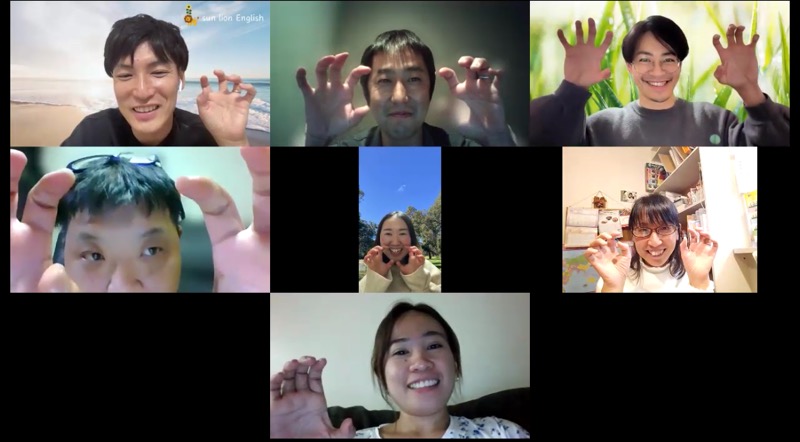
会場
zoom
クラス内容
「tell me about you☺️」
単語・フレーズ

Key Phrase:
I’m a photographer.
(私はカメラマンです)
ポイント
・自己紹介の超基本フレーズ
・仕事を一言で伝えられて便利
・初対面・プロフィールにそのまま使える
Example
- I’m a photographer, and I take family and business profile photos.
(カメラマンで、家族写真やビジネス用プロフィール写真を撮っています。)

Key Phrase:
I live in a share house with people from many countries.
(いろいろな国の人とシェアハウスに住んでいます)
ポイント
・暮らし+国際的な環境を一文で説明
・people from many countries は万能表現
Example
- I live in a share house in Shibuya with people from many countries.
(渋谷で、いろいろな国の人とシェアハウスに住んでいます。)

Key Phrase:
My children wrote a letter to Santa.
(子どもたちがサンタさんに手紙を書きました)
ポイント
・ほっこりする日常を伝えられる
・過去形のシンプルで使いやすい文
Example
- My children wrote a letter to Santa before Christmas.
(クリスマス前に、子どもたちはサンタさんに手紙を書きました。)

Key Phrase:
I like the way they think.
(その考え方が好きです)
ポイント
・子ども・相手への気持ちをやさしく表現
・価値観や感性を褒めるときに◎
Example
- I like the way my children think about Santa.
(サンタさんのことを考える子どもたちの発想が好きです。)

Key Phrase:
I watch them every year.
(毎年観ています)
ポイント
・習慣を表すシンプルな表現
・映画・イベント・行事にも応用可
Example
- I watch the Detective Conan movies every year.
(名探偵コナンの映画を毎年観ています。)

Key Phrase:
I get excited every time.
(毎回ワクワクします)
ポイント
・感情を自然に伝えられる
・エンタメの感想にぴったり
Example
- They always have explosive scenes, so I get excited every time.
(いつも迫力のあるシーンがあって、毎回ワクワクします。)

Key Phrase:
I travel all over Japan for business.
(仕事で日本中を出張しています)
ポイント
・仕事+ライフスタイルを簡潔に表現
・all over Japan は覚えておくと便利
Example
- I travel all over Japan for business, often by plane.
(仕事で日本中を、よく飛行機で移動しています。)

Key Phrase:
I used to play futsal.
(昔フットサルをしていました)
ポイント
・used to は過去の習慣を話す定番
・自己紹介で会話が広がりやすい
Example
- I used to play futsal, and that’s how I became friends with Shota.
(昔フットサルをしていて、それがきっかけでしょうたと友達になりました。)
2025年12月16日(火)

会場
zoom
クラス内容
「日記でディスカッション🥳」
単語・フレーズ

Key Phrase:
I’m broke.
(お金がない/金欠です)
ポイント
・日常会話でとてもよく使うカジュアル表現
・「Wow, I’m broke」 のように感情を入れると自然
・自虐ネタ・雑談トークにぴったり
Example
- You know that moment when you realize, “Wow, I’m broke”?
(「やば、金欠だわ…」って気づく瞬間、あるよね?)

Key Phrase:
I’ve gotten into AI.
(AIにハマっています)
ポイント
・「最近ハマっていること」を表す万能フレーズ
・“get into 〜” は趣味・習慣・技術に使いやすい
・過去との変化(used to think 〜)を話す流れが自然
Example
- I used to think AI was cold, but now I use it every day for work.
(前はAIは冷たいものだと思っていましたが、今では仕事で毎日使っています。)

Key Phrase:
I learned a lot by listening to other people’s presentations.
(他の人の発表を聞いて、とても勉強になりました)
ポイント
・「〜して学んだ」を表す自然な表現
・learn a lot by 〜ing はそのまま使える便利フレーズ
・勉強会・セミナー・ミーティングの感想に最適
Example
- I learned a lot by listening to other people’s presentations at the study meeting.
(勉強会で他の方の発表を聞いて、多くの学びがありました。)

Key Phrase:
It made me think about my company’s management.
(自分の会社の経営について考えるきっかけになりました)
ポイント
・It made me think about 〜 は「きっかけ」を表す定番表現
・前向きな気づき・内省を自然に伝えられる
・ビジネス系の振り返りに使いやすい
Example
- This study meeting made me think about my company’s management more seriously.
(この勉強会を通して、自分の会社の経営についてより真剣に考えるようになりました。)

Key Phrase:
I’ve been watching anime on Amazon Prime.
(Amazonプライムでアニメを見ています)
ポイント
・I’ve been 〜ing は「最近ずっと続けている習慣」を表す自然な形
・日常ルーティンの紹介にとても使いやすい
・動画・ドラマ・アニメ、何にでも応用可能
Example
- Recently, I’ve been watching anime on Amazon Prime during breakfast and dinner.
(最近は朝ごはんや夜ご飯の時間に、Amazonプライムでアニメを見ています。)

Key Phrase:
It’s a bit violent, but it’s very interesting.
(少し残酷だけど、とても面白いです)
ポイント
・A, but B の形で正直な感想をバランスよく伝えられる
・映画・ドラマ・本のレビューで頻出
・ネガティブ→ポジティブの流れが自然
Example
- Attack on Titan is a bit violent, but it’s very interesting.
(進撃の巨人は少し残酷ですが、とても面白いです。)
2025年12月10日(火)
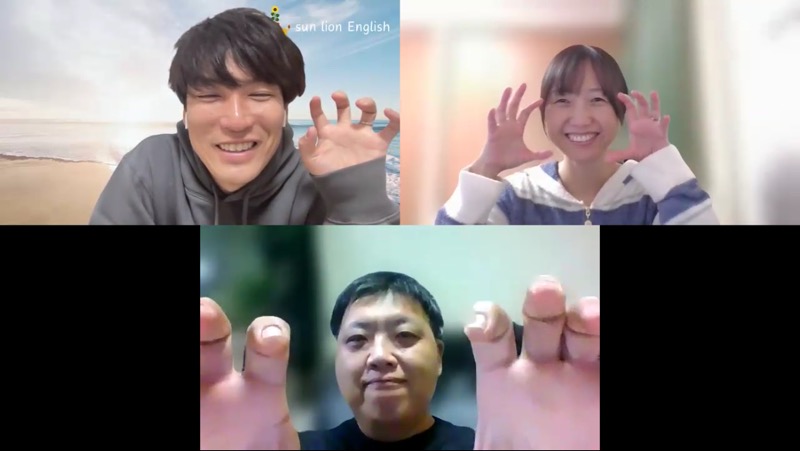
会場
zoom
クラス内容
「Japanを教えて🇯🇵」
単語・フレーズ

Key Phrase: It is a traditional Japanese performing art.
(それは日本の伝統的な舞台芸術です)
ポイント
・文化紹介の基本フレーズ
・「performing art」で“舞台芸術”を自然に表現できる
・海外の人に説明するときにそのまま使える
Example
- Kabuki is a traditional Japanese performing art that includes drama, dance, and music.
(歌舞伎は、ドラマ・舞踊・音楽から成る日本の伝統的な舞台芸術です。)

Key Phrase: It is performed only by male actors.
(男性俳優だけによって演じられます)
ポイント
・歌舞伎の特徴をシンプルに説明
・“those who play female roles are called onnagata” とセットで覚えると強い
Example
- In Kabuki, only male actors perform, and the actors who play female roles are called onnagata.
(歌舞伎では男性のみが演じ、女性役を演じる俳優は「女形」と呼ばれます。)

Key Phrase:
It is a Japanese New Year tradition.
(それは日本の新年の伝統行事です)
ポイント
・「伝統行事」をシンプルに説明できる基本フレーズ
・“New Year tradition” は海外の人にも直感的に伝わる
・まず概要を説明するときに便利
Example
- Kakizome is a Japanese New Year tradition where people write their first calligraphy of the year.
(書き初めは、一年で最初の書道を行う日本の新年の伝統行事です。)

Key Phrase:
They write positive words, wishes, or goals.
(前向きな言葉や願い、目標を書きます)
ポイント
・書き初めが“何を書くのか”を端的に説明
・「positive words」「goals」はそのまま使える自然な表現
・行事の意味を伝えたいときに使える
Example
- People usually write positive words, wishes, or goals using a brush and ink.
(人々は通常、筆と墨を使って前向きな言葉や願い、目標を書きます。)

Key Phrase:
People pray for health and happiness.
(人々は健康と幸福を祈ります)
ポイント
・初詣の“目的”をシンプルに説明
・健康・幸福は海外でも伝わりやすい普遍的なテーマ
・神社で何をするのかを自然に説明できる
Example
- During Hatsumode, people pray for health and happiness for the coming year.
(初詣では、人々は来たる一年の健康と幸福を祈ります。)

Key Phrase:
It is one of the biggest annual traditions in Japan.
(日本の代表的な年中行事の一つです)
ポイント
・初詣の“規模・重要性”を伝えられる
・「annual tradition」は海外の人にもすぐ伝わる自然な表現
・“crowds line up for hours” などの説明に相性◎
Example
- Hatsumode is one of the biggest annual traditions in Japan, and many people line up for hours at famous shrines.
(初詣は日本の代表的な年中行事の一つで、多くの人が有名な神社に長時間並びます。)
2025年12月2日(火)
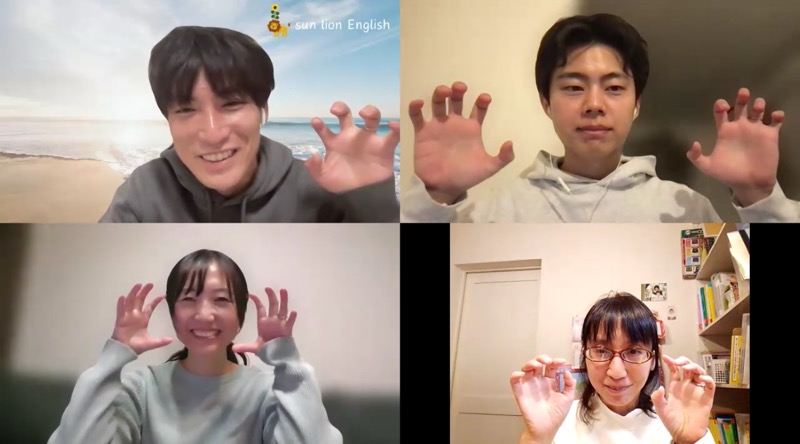
会場
zoom
クラス内容
「日記でディスカッション🥳」
単語・フレーズ

Key Phrase:It’s getting harder to wake up.
(起きるのがだんだん難しくなってきた)
ポイント
・季節や状況の変化を表すときによく使うフレーズ
・“It’s getting 〜” は日常英会話で超便利!
Example Sentence
- It’s been getting really cold lately, and it’s getting harder to wake up in the morning.
(最近とても寒くなってきて、朝起きるのが辛くなってきました。)

Key Phrase: I’m going to try setting my alarm earlier.
(アラームを早めに設定してみます)
ポイント
・ “I’m going to try 〜” → 行動を変えるときの前向き表現
・ 小さな習慣改善にぴったり!
Example Sentence
- I’m going to try setting my alarm 30 minutes earlier so I can wake up on time.
(時間通りに起きるためにアラームを30分早く設定してみます。)

Key Phrase: I bring a frozen lunch box to work.
(仕事に冷凍のお弁当を持っていきます)
ポイント
・日常の習慣を話すときの鉄板フレーズ
・“bring 〜 to work” →「職場に持っていく」
Example
- These days, I bring a frozen lunch box to work.
(最近は、仕事に冷凍弁当を持っていきます。)

Key Phrase: It saves time.
(時間を節約できます)
ポイント
・効率を語るときにめちゃ使える短いフレーズ
・ビジネスでも日常でも万能!
Example
- I cook about five lunch boxes at once every week because it saves time.
(時間を節約できるので、毎週まとめて5食分のお弁当を作ります。)

Key Phrase: I’ve been studying English with Radio Eikaiwa.
(ラジオ英会話で英語を勉強しています)
ポイント
・現在も続いている習慣 → 現在完了進行形が自然
・英語学習の方法を説明しやすい
Example
- There are four stories a week, so I study one every one or two days.
(週に4つストーリーがあるので、1〜2日に1つ勉強しています。)

Key Phrase: I don’t want to waste time.
(時間を無駄にしたくありません)
ポイント
・学習意欲の高さをシンプルに表現
・場所を問わず英語学習している描写がGood!
Example
- Even on my day off, I study English at the foot spa or while my kids play bowling.
(休日でも、足湯や子どもたちがボウリングしている間に英語を勉強します。)
2025年11月25日(火)

会場
zoom
クラス内容
「日記でディスカッション🥳」
単語・フレーズ

Daily Routine & Gratitude
Key Expression: I always want to express my gratitude to my wife.
Why it’s meaningful:
• 日常の“ありがとう”を丁寧に英語で伝える表現
• “express my gratitude” はフォーマルで美しい言い方
Variation:
• I’m always grateful for everything my wife does for our family.
(家族のためにしてくれる全てに、いつも感謝しています。)

Healthy Morning Habits
Key Expression: After refreshing my mind through meditation…
Why it’s useful:
• “refresh my mind” は心をリセットする表現として自然
• 習慣を語るときの流れ(Meditation → Walk)が英語的にわかりやすい
Example Sentence:
• Meditation helps me start my day with a clear mind.
(瞑想のおかげで、心を整えて一日を始められます。)

Arcade with Family
Key Expression: crane game(クレーンゲーム)
Why it’s useful:
• 日本でもよく使う単語だけど、英語だと「UFOキャッチャー」とは言わない
• “win a prize” で景品を取るという自然な表現になる
Sample sentence:
• My nephew and niece won three crocodile figures from the crane game.
(甥と姪がクレーンゲームでワニのフィギュアを3つ取ってくれました。)

Fun but relatable ending
Key Expression: I’m still thinking about how I should use them.
Why it’s charming:
• 日常でよくある「使い道に困るけど嬉しい」気持ちを表現できる
• 文法的にも “how I should 〜” が良い練習になるフレーズ
Sample sentence (variation):
• I have no idea what to do with them, but they make me smile.
(どう使うか全く分からないけど、見ると笑顔になります。)

【🇵🇭タガログ語 フレーズ集】
◆便利フレーズ
Sandali lang.
(サンダリ ラン)
= ちょっと待って
Maghintay.
(マグヒンタイ)
= 待って
Magkano ito?
(マグカーノ イト)
= これはいくらですか?
Magkano po ito?
(マグカーノ ポ イト)
= これはいくらですか? ※丁寧
⸻
◆場所・移動
Saan ka pupunta?
(サアン カ ププンタ)
= どこに行くの?
Saan = サアン = どこ
Ka = カ = あなた
Pupunta = ププンタ = 行く
⸻
◆自己紹介・あいさつ
Ako po si Shota.
(アコ ポ シ ショウタ)
= 私は翔太です ※丁寧
Magandang gabi.
(マガンダン ガビ)
= こんばんは
⸻
◆単語メモ
lang = ラン = 〜だけ / just
po = ポ = 丁寧語(目上の人・初対面)
2025年11月18日(火)
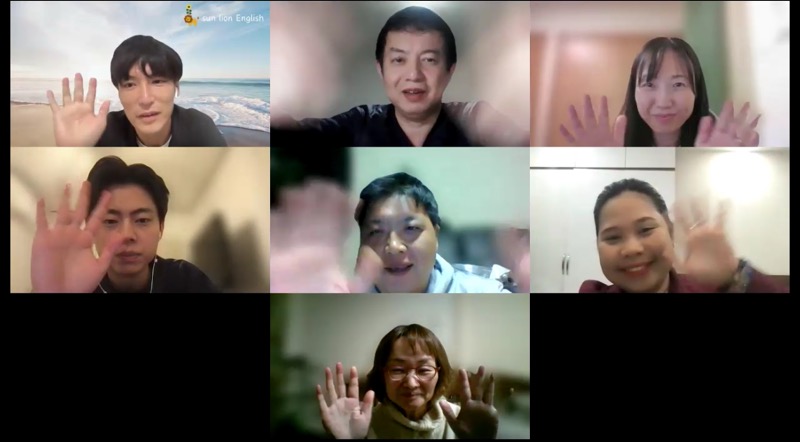
会場
zoom
クラス内容
「tell me about you☺️」
単語・フレーズ
I can’t stop watching because I’m so curious to know what happens next.
• 意味: 続きが気になって見るのをやめられません。
• ポイント:
- “can’t stop 〜ing” は「やめられない」便利表現。
- 好きなドラマ・アニメ・漫画の説明に使える!
• 例文:
- I can’t stop reading this manga because every chapter is so exciting.
When I have free time, I just watch the anime “Kingdom.”
• 意味: 時間があるといつも『キングダム』を見ています。
• ポイント:
- “When I have free time, I just 〜” は日常ルーティン紹介に最適。
- “just” で「ただ〜しているだけ」のニュアンスが出る。
• 例文:
- When I have free time, I just relax and watch YouTube.
We usually leave home in the middle of the night.
• 意味: 私たちはたいてい真夜中に家を出ます。
• ポイント:
- “in the middle of the night” は自然でよく使う表現。
- 夜のドライブ・旅行の話にぴったり。
• 例文:
- We left in the middle of the night to avoid traffic.
I especially love Jim Carrey’s films.
意味: 特にジム・キャリーの映画が大好きです。
• ポイント:
- “especially” で「特に〜」が自然に言える。
- 趣味紹介・自己紹介でよく使える。
• 例文:
- I especially love Marvel movies.
No matter how many times I watch them, they still make me laugh.
意味: 何度見ても笑ってしまいます。
• ポイント:
- “No matter how many times 〜” は「何度〜しても」。
- 好きな映画・アニメ・音楽を語るときに超便利。
• 例文:
- No matter how many times I hear this joke, it still makes me laugh.
2025年11月11日(火)

会場
zoom
クラス内容
「日記でディスカッション🥳」
単語・フレーズ
decided to serve my coffee there.
• 意味:「そこで自分のコーヒーを提供することに決めました。」 • ポイント:
- “serve” は「提供する・出す」という意味で、カフェやレストランの文脈にぴったり。
- “there” をつけることで、「そのカフェで」という場所が明確になります。
🪄例文:
- I decided to serve my original blend coffee there.
(自分のオリジナルブレンドをそこで出すことにしました。)
I’m excited to open my coffee shop
• 意味:「自分のコーヒーショップを開くことにワクワクしています。」 • ポイント:
- “I’m excited to 〜” は「〜するのが楽しみ」という前向きな感情を表す定番表現。
- 将来の夢や新しい挑戦を話すときに自然に使えるフレーズです。
🪄例文:
- I’m excited to open my own coffee shop and meet new customers.
(自分のカフェを開いて、新しいお客様に会えるのが楽しみです。)
The sight of the hot air balloons flying in the sky was beautiful.
• 意味: 空を飛ぶ熱気球の光景は本当に美しかったです。 • ポイント:
- “The sight of 〜” は「〜の光景」という上品な表現。
- “was beautiful” で感動をシンプルかつ自然に伝えています。
🪄例文:
- The sight of colorful balloons floating over Saga City was breathtaking.
(色とりどりの気球が佐賀の空に浮かぶ光景は息をのむほどでした。)
Hot air balloon pilots from all over the world came to Saga City.
• 意味: 世界中から熱気球のパイロットたちが佐賀市に集まりました。 • ポイント:
- “from all over the world” は国際的な雰囲気を出す定番フレーズ。
- イベントの規模を伝えるときにとても使える表現です。
🪄例文:
- Pilots from all over the world gathered in Saga City, making the festival truly global.
(世界中のパイロットが佐賀市に集まり、まさに国際的なお祭りでした。)
2025年11月4日(火)
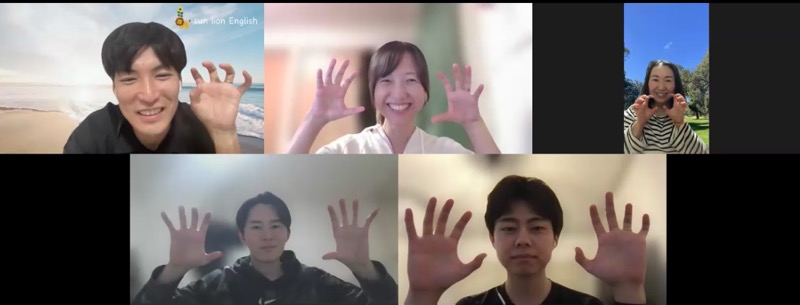
会場
zoom
クラス内容
「Japanを教えて🇯🇵」
単語・フレーズ
People dance in a circle to express their gratitude to their ancestors.
• 意味:「人々はご先祖様への感謝を表すために円になって踊ります。」 • ポイント:
- “in a circle” は「円になって」という自然な表現。
- “express their gratitude” は「感謝を表す」のフォーマルで美しい言い方です。
🪄例文:
- People express their gratitude to nature during Bon Odori.
(盆踊りでは、人々は自然への感謝も表します。)
We can see it in the summer.
• 意味:「夏にそれを見ることができます。」 • ポイント:
- “see it” は「見ることができる」という意味でOKですが、“enjoy it” に変えるともっと自然で親しみやすいです。
🪄例文:
- We can enjoy Bon Odori at festivals in the summer.
(夏のお祭りで盆踊りを楽しむことができます。)
drivers rarely stop for pedestrians
• 意味:「運転手は歩行者のためにほとんど止まらない」 • ポイント:
- “rarely” は「めったに~しない」という頻度を表す副詞。
- “pedestrians” は「歩行者」という正式な言葉。旅行中に道を渡るときの会話にも使えます。
🪄例文:
- In Vietnam, drivers rarely stop for pedestrians, even at a crosswalk.
(ベトナムでは、横断歩道でも運転手が歩行者のために止まることはほとんどありません。)
Japan values order and safety
• 意味:「日本は秩序と安全を大切にしている」 • ポイント:
- “values” は「〜を重んじる・大切にする」という動詞。
- “order and safety” の組み合わせは、社会的な規律と安心感を表すとても日本らしい表現。
🪄例文:
- The difference made me realize how Japan values order and safety.
(その違いから、日本がどれほど秩序と安全を大切にしているか気づきました。)
2025年10月28日(火)

会場
zoom
クラス内容
「日記でディスカッション🥳」
単語・フレーズ
I was still sleeping with my summer blanket
• 意味:まだ夏用の毛布で寝ていました • ポイント:
- “was still ~ing” は「まだ〜していた」という継続を表す自然な表現。
- 季節の変わり目を感じさせる良い使い方です🍂
例文:
- I was still wearing short sleeves last week.(先週はまだ半袖を着ていました。)
- I was still sleeping when my alarm went off.(アラームが鳴ったとき、まだ寝ていました。)
I switched to my winter blanket
• 意味:冬用の毛布に変えました • ポイント:
- “switch to” は「〜に切り替える」というとても便利な表現。
- 季節の変化・習慣の変更・デバイスの切り替えなど幅広く使えます。
例文:
- I switched to hot coffee this morning.(今朝はホットコーヒーに変えました。)
- I switched to a thicker blanket because it’s getting cold.(寒くなってきたので厚い毛布に変えました。)
It was the first time I sold one of my own berets, a beanie, and a scarf.
• 意味:自分で作ったベレー帽、ビーニー、マフラーを初めて売ることができました。 • ポイント:
- “It was the first time I sold …” は「〜したのは初めて」というときに使う定番の形。
- 「自分で作ったもの」を強調する one of my own の使い方が自然でとても良いです。
例文:
- It was the first time I cooked dinner for my family.(家族に初めて夕食を作ってあげました。)
- It was the first time I sold something I made myself.(自分で作ったものを初めて売りました。)
I want to try making and selling socks and bags next time.
• 意味:次は靴下やバッグを作って売ってみたいです。 • ポイント:
- “try ~ing” は「〜してみたい」という自然な意志表現。
- “making and selling” のように動詞を並べる形も完璧です!
例文:
- I want to try making earrings next time.(次はピアスを作ってみたいです。)
- I want to try selling my handmade products online.(自分の手作り作品をオンラインで売ってみたいです。)
make my dream come true
• 意味:「夢を叶える」 • ポイント:
- 「夢を叶える」は英語で “make one’s dream come true” が定番の言い方。
- “realize my dream” でもOKですが、“make my dream come true” の方が自然で感情的です。
🪄例文:
- She made her dream come true by becoming a teacher.
(彼女は教師になるという夢を叶えました。)
to marry a beautiful wife someday
• 意味: 「いつか綺麗な奥さんと結婚する」 • ポイント:
- “someday” を入れることで、まだ未来の夢だというニュアンスが柔らかく伝わります。
- “beautiful wife” は自然ですが、“a kind and beautiful wife” のように性格を加えるとより温かみが出ます。
🪄例文:
- He dreams of marrying a kind and beautiful woman someday.
2025年10月21日(火)
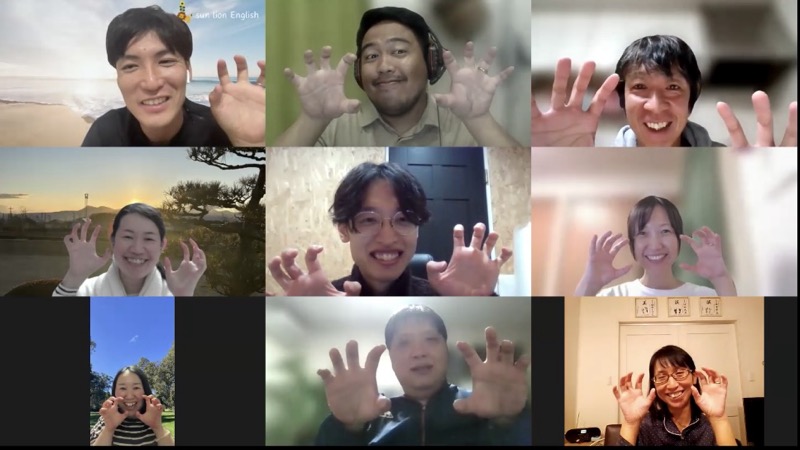
会場
zoom
クラス内容
「tell me about you☺️」
単語・フレーズ
when I have free time
• 意味:時間があるときに、暇なときに • 例文:When I have some free time, I like reading manga.
(時間があるときは、マンガを読むのが好きです)
• ポイント:「free time」は“空いている時間”という自然な日常表現。
類似表現:
- in my spare time(余暇に)
- during my downtime(休憩中に/カジュアル)
💡よく使う質問:「What do you do in your free time?」=趣味を聞く定番フレーズ。
I’m really into it
• 意味:すごくハマっている、大好き • 例文:I’m still in the middle of it, but I’m really into it!
(まだ途中ですが、すごくハマっています!)
• ポイント:「be into 〜」=“〜が好き”“〜に夢中”。カジュアルで自然な会話表現。
例:I’m into Japanese dramas.(日本のドラマにハマってます)
似た表現:
- I’m hooked on it.(夢中になってる)
- I can’t stop reading it.(読むのが止められない)
I often read books or comics
• 意味:本やマンガをよく読む • ポイント:「often」は頻度を表す副詞で、“よく〜する”という自然な表現。
例文:
- I often read before I go to bed.(寝る前によく読む)
- I sometimes watch movies instead.(代わりに映画を見ることもある)
✨言い換え例:
- I love spending my free time reading.(自由時間は読書して過ごすのが好きです)
- Reading helps me relax.(読書をするとリラックスできます)
I was able to win second place
• 意味:2位を取ることができました • ポイント:
- “I won second place” でもOKですが、
- “I was able to win” は「努力の結果できた」というニュアンスがあり、達成感を表せます✨
例文:
- I was able to win second place in my final tournament.
(最後の大会で2位を取ることができました。)
- I was able to finish the race.(レースを完走することができた。)
I played badminton for three years in high school
• 意味:高校で3年間バドミントンをしていました • ポイント:
- “for three years” は「期間」を表す基本フレーズ。
- “in high school” は「高校時代に」という自然な表現。
例文:
- I played the guitar for two years in college.(大学で2年間ギターをしていました。)
- I joined the badminton club in my first year of high school.(高校1年の時にバドミントン部に入りました。)
2025年10月14日(火)
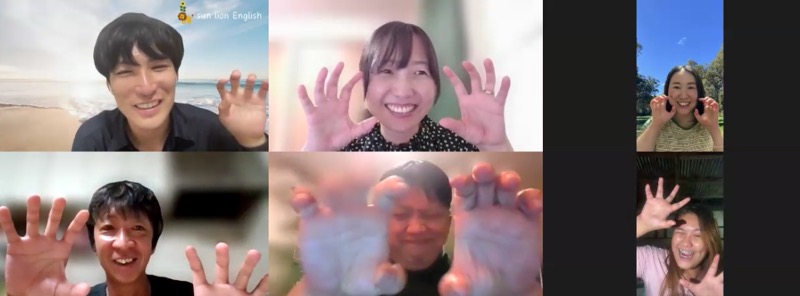
会場
zoom
クラス内容
「日記でディスカッション🥳」
単語・フレーズ
day off
• 意味:休日、休みの日 • 例文:Yesterday I had a day off.
(昨日はお休みでした)
• ポイント:「day off」は「仕事や学校がない日」を指す自然な表現。
例:I usually clean my room on my day off.
(休みの日はだいたい部屋を掃除します)
spend the whole day at home
• 意味:一日中家で過ごす • 例文:I was able to relax and spend the whole day at home peacefully.
(リラックスして一日中家で穏やかに過ごすことができました)
• 関連表現:
- stay home(家にいる)
- chill at home(家でまったりする/カジュアル)
- have a lazy day(何もせずゆっくり過ごす)
trial batch
• 意味:試作品、試し焼き • 例文:I made a trial batch of Anzac biscuits.
(アンザックビスケットの試し焼きを作りました)
• ポイント:「batch」は「ひと焼き分・ひとまとめ」を意味。
試しに作ったときは “trial batch” が自然。
例:I baked a trial batch before the event.(イベント前に試し焼きをした)
enjoy their time at the cafe
• 意味:カフェでの時間を楽しむ • 例文:I hope my customers will enjoy their time at the cafe.
(お客様がカフェでの時間を楽しんでくれますように)
• ポイント:「enjoy their time」は“その場の雰囲気や体験を楽しむ”という柔らかい表現。
関連表現:
- have a relaxing time(ゆったり過ごす)
- enjoy the atmosphere(雰囲気を楽しむ)
end up doing
• 意味:結局〜してしまう • 例文:Whenever I see a Starbucks, I somehow end up walking in.
(スターバックスを見ると、なぜか結局入ってしまいます)
• ポイント:「end up 〜ing」は“予想外に・気づいたら〜していた”というニュアンス。
例:I ended up buying too much.(つい買いすぎちゃった)
日常英会話でよく使う自然な表現です。
a quiet sense of pride
• 意味:静かな誇り、密かな満足感 • 例文:A quiet sense of pride fills me.
(静かな誇りが私を満たします)
• ポイント:控えめな自己満足を表す上品なフレーズ。
似た表現:
- feel quietly proud(密かに誇らしい気持ちになる)
- have a small moment of pride(ちょっとした誇りの瞬間を感じる)
2025年10月8日(火)

会場
zoom
クラス内容
「Japanを教えて🇯🇵」
単語・フレーズ
fairy tale
• 意味:おとぎ話、昔話 • 例文:Kaguya-hime is a Japanese fairy tale.
(かぐや姫は日本の昔話です)
• ポイント:「fairy tale」は “fantasy stories for children(子ども向けの空想的な物語)” の意味。
例:Cinderella(シンデレラ)や Snow White(白雪姫)も fairy tales。
return to the moon
• 意味:月に帰る • 例文:In the end, she returned to the moon.
(最後に、彼女は月へ帰りました)
• ポイント:「return to」は“〜へ戻る”という意味。
例:I returned to my hometown.(故郷に戻った)
※「go back to」でもOKだが、「return to」の方が少し丁寧で物語に合う。
used to
• 意味:〜に慣れている • 例文:Japanese people are used to weak earthquakes.
(日本人は弱い地震に慣れています)
• ポイント:「be used to + 名詞/動名詞」で“慣れている”。
例:I’m used to cold weather.(寒さに慣れている)
※「used to + 動詞原形」と混同しないように注意!(こちらは“以前は〜していた”)
cause panic
• 意味:パニックを引き起こす • 例文:Even a weak earthquake can cause panic in Australia.
(オーストラリアでは、小さな地震でもパニックを引き起こすことがあります)
• ポイント:「panic」は名詞でも動詞でも使える便利な単語。
例:People panicked when the ground started shaking.
can’t stand it
• 意味:我慢できない/大嫌い • 例文:Some people love it, while others can’t stand it.
(それが大好きな人もいれば、全くダメな人もいます)
• ポイント:「can’t stand」は「hate(嫌う)」よりも自然で会話的。食べ物やにおい、音などにもよく使う。
environmentally friendly city
• 意味:環境にやさしい都市 • 例文:Today, Ube is internationally recognized as an environmentally friendly city.
(現在、宇部市は国際的に「環境にやさしい都市」として認められています)
• ポイント:「environmentally friendly」は「eco-friendly」とも言える。どちらも “環境に配慮している” というポジティブな意味。
take action against pollution
• 意味:汚染に対して行動を起こす • 例文:Ube was one of the first cities in Japan to take action against pollution.
(宇部は日本で最初に汚染対策に取り組んだ都市のひとつでした)
• ポイント:「take action」=「行動を起こす」。「against」を加えることで“〜に対抗して”という意味になる。
2025年9月30日(火)
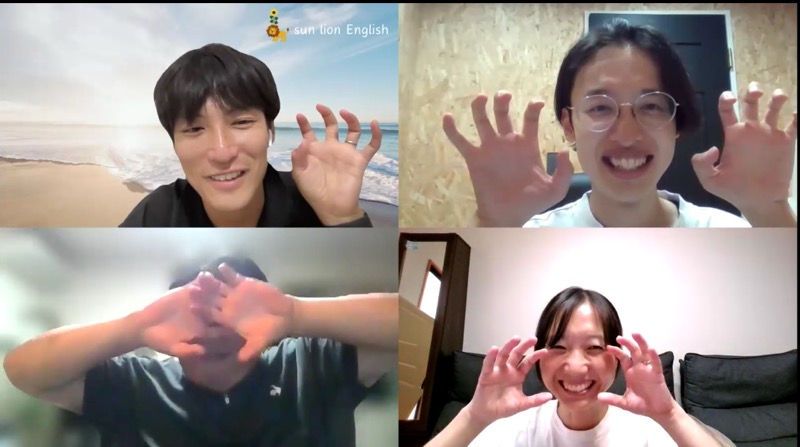
会場
zoom
クラス内容
「ニュースでディスカッション🗽」
単語・フレーズ
coffee grounds
• 意味:コーヒーかす • 例文:A Belgian company grows mushrooms from coffee grounds.
(ベルギーの会社はコーヒーかすからキノコを育てています)
• ポイント:「grounds」は複数形で「粉」「かす」という意味。
leftover coffee
• 意味:飲んだ後に残るコーヒー(液体やかすの両方に使える) • 例文:Coffee grounds are leftover coffee after brewing.
(コーヒーかすは、抽出後に残るコーヒーです)
• ポイント:「leftover」は「残りもの」。食べ物や飲み物以外にも幅広く使える。
is still recording
• 意味:まだ録画している • 例文:The camera is still recording after the bird flies away.
(鳥が飛び去ったあともカメラはまだ録画している)
• ポイント:「still」は「まだ〜している」という継続を表す便利な副詞。
mawashi (sumo belt)
• 意味:相撲で使うまわし • 例文:In sumo, wrestlers wear a belt called a mawashi.
(相撲では力士は「まわし」と呼ばれるベルトを着けます)
• ポイント:英語でもそのまま mawashi と紹介されることが多い。説明するときは “sumo belt” を補足すると親切。
grow the sport
• 意味:スポーツを広める、発展させる • 例文:The club wants to grow the sport of sumo in New York.
(そのクラブはニューヨークで相撲を広めたいと考えています)
• ポイント:「grow」は「育てる」から転じて「発展させる」「広げる」という意味。スポーツやビジネス、コミュニティでもよく使われる表現。
2025年9月23日(火)
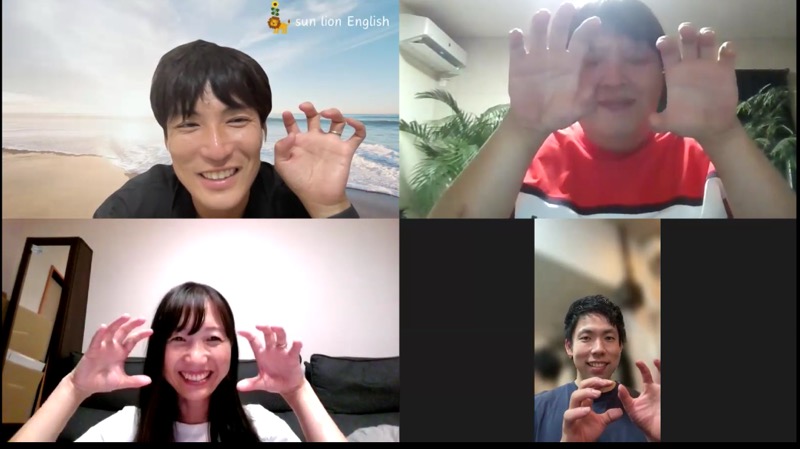
会場
zoom
クラス内容
「tell me about you☺️」
単語・フレーズ
a sense of accomplishment
• 意味:達成感 • 例文:I feel a great sense of accomplishment when I reach the summit.
(頂上に着いたとき、大きな達成感を感じます)
• ポイント:仕事や勉強の成果を話すときにも使えます。
scenery you don’t see in daily life
• 意味:日常では見られない景色 • 例文:You can enjoy scenery you don’t see in daily life.
(日常では見られない景色を楽しめます)
• ポイント:「beautiful scenery」は不可算名詞、“sceneries”とは言わない!
Food tastes better after …
• 意味:〜の後は食べ物がより美味しい • 例文:Food tastes better after reaching the top of a mountain.
(山頂に着いた後の食べ物は格別です)
• ポイント:「お腹が空いているとき」「運動の後」などでも応用できます。
rice ball (onigiri)
• 意味:おにぎり • 例文:I often bring a rice ball for lunch.
(お昼におにぎりをよく持っていきます)
• ポイント:「onigiri」とそのまま言っても通じるようになってきていますが、英語では基本 rice ball。
observing people
• 意味:人々を観察する(ややフォーマル/真面目な響き)
• 例文:I enjoy observing people in the park.
(公園で人々を観察するのが好きです)
• ポイント:
• 「people-watching」=気軽な趣味・娯楽っぽい表現。
• 「observing people」=学術的・分析的な響き(心理学、社会学、研究などに使われやすい)。
• 使い分け:友達との会話なら people-watching、プレゼンやレポートなら observing people が自然。
my favorite filling is …
• 意味:好きな具材は〜です • 例文:My favorite filling is salmon.
(好きなおにぎりの具は鮭です)
• ポイント:「favorite」は人や物にも使えて便利!おにぎり以外の食べ物にも応用できます。
2025年9月16日(火)
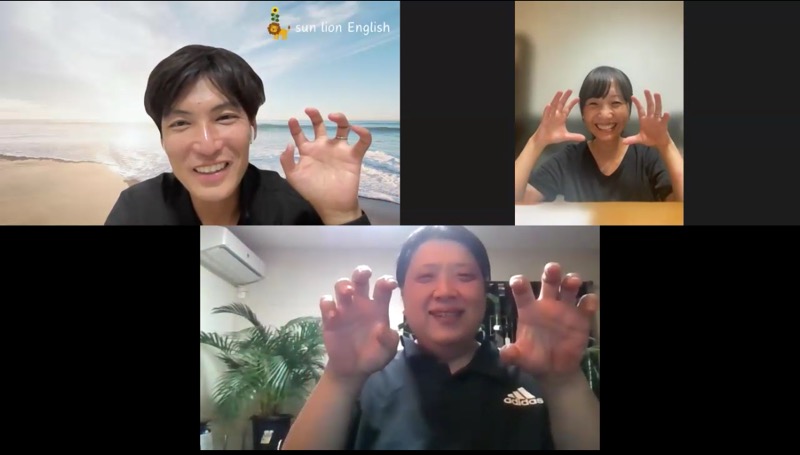
会場
zoom
クラス内容
「日記でディスカッション🥳」
単語・フレーズ
in a rush
• 意味:急いで、慌てて • 関連単語:in a hurry / quickly / hastily • 例文:I was in a rush and forgot my swimsuit in the locker.
(急いでいて水着をロッカーに忘れました)
• ポイント:「in a rush」は日常会話でよく使う。ビジネスなら「in a hurry」もOK。
give someone strange looks
• 意味:(人に)変な目で見る • 関連単語:stare at / look funny at / puzzled look • 例文:People gave me strange looks when I jumped into the pool.
(プールに飛び込んだら、人々が変な目で見ました)
• ポイント:「give someone a look」で「特定の視線を送る」という表現になる。
So embarrassing!
• 意味:めっちゃ恥ずかしい! • 関連単語:awkward / ashamed / that was awkward • 例文:I jumped into the pool with my clothes on—so embarrassing!
(服のままプールに飛び込んでしまった。超恥ずかしい!)
• ポイント:「embarrassing」は「自分が恥ずかしい思いをする時」に使う。日本語の「恥ずかしい(shy)」とは少し違う。
be blown away (by …)
• 意味:〜に圧倒される/すごく感動する • 例文:I was blown away by how delicious frozen figs were.
(冷凍イチジクがあまりに美味しくて感動しました)
• ポイント:ポジティブな驚きを表すときに便利!
2025年9月15日(土)

会場
zoom
クラス内容
単語・フレーズ
busy schedule
• 意味:忙しいスケジュール • 関連単語:hectic schedule / tight schedule / full day • 例文:Today, I had a busy schedule teaching IELTS to secondary students.
(今日は中学生にIELTSを教える忙しいスケジュールでした)
• ポイント:「busy schedule」は日常でもビジネスでもよく使う便利フレーズ。
secondary students
• 意味:中等教育の生徒(日本でいう中学生〜高校生) • 関連単語:junior high school students / high school students / pupils(英) • 例文:I teach IELTS to secondary students at my school.
(私は学校で中高生にIELTSを教えています)
• ポイント:イギリスや国際英語では「secondary school」が中等教育全般を指す。
We want to work in Japan.
• 意味:私たちは日本で働きたいです • 関連単語:employment / career / job opportunity • 例文:Watashitachi wa Nihon de hatarakitai desu. → We want to work in Japan.
(私たちは日本で働きたいです)
• ポイント:「want to work in 〜」は海外就職や留学の面接でもよく使う表現。
2025年 9月9日(火)
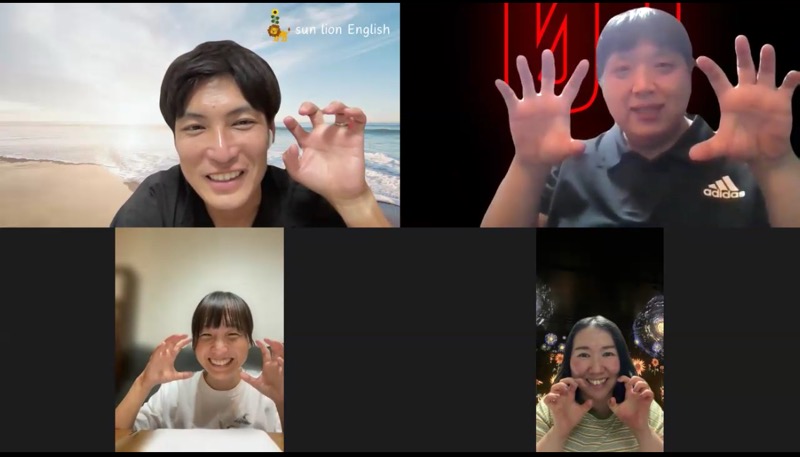
会場
zoom
クラス内容
「日記でディスカッション🥳」
単語・フレーズ
condensed milk
• 意味:練乳(砂糖入りの濃縮ミルク)
• 関連単語:evaporated milk(無糖の濃縮乳) / sweetened milk / dairy product
• 例文:Avocado with condensed milk tastes really good.
(アボカドに練乳をかけると、とても美味しいです)
• ポイント:フィリピンや東南アジアではデザートによく使われる。日本だとイチゴ+練乳が定番。
as usual
• 意味:いつものように • 関連単語:as always / typically / normally • 例文:As usual, I ate avocado with soy sauce and wasabi.
(いつものように、アボカドを醤油とわさびで食べました)
• ポイント:「毎度おなじみ」のニュアンス。会話でも文章でも使いやすい便利フレーズ。
river cruise boat
• 意味:川下りの遊覧船 • 関連単語:boat ride / sightseeing boat / gondola • 例文:We enjoyed a river cruise boat in Yanagawa.
(柳川で川下りの遊覧船を楽しみました)
• ポイント:「cruise」は船旅の意味。小さな川下りでも「river cruise」でOK。
the best 〜 I’ve ever eaten
• 意味:今まで食べた中で一番の〜 • 関連単語:the most delicious / unforgettable taste / favorite • 例文:It was the best eel I’ve ever eaten.
(今まで食べた中で一番美味しいウナギでした)
• ポイント:「I’ve ever 〜」は経験を強調する便利なフレーズ。旅行や食事の感想に使える。
That was my whole day.
• 意味:それが私の一日全部でした。 • 関連単語:That’s it. / My day was over. / That’s all I did. • 例文:I ate, went to bed, and that was my whole day.
(食べて寝て、それが一日の全部でした)
• ポイント:日記やカジュアルな会話の締めくくりに便利なフレーズ。
2025年9月7日(土)

会場
zoom
クラス内容
「ハートフルスピーチ🥰」
単語・フレーズ
Just smile
• 意味:ただ笑って(微笑んで)
• 関連単語:keep smiling / cheer up / grin / laugh
• 例文:When you feel nervous before a presentation, just smile.
(プレゼン前に緊張したら、ただ笑ってみて)
• ポイント:短くシンプルだけど、気持ちを和らげる魔法のフレーズ。
「Waraeba iiyo(笑えばいいよ)」と同じニュアンスで使える。
screen name
• 意味:スクリーンネーム、ネット上で使う名前 • 関連単語:username / handle / nickname • 例文:In social media, many people use a screen name instead of their real name.
(SNSでは、本名の代わりにスクリーンネームを使う人が多いです)
• ポイント:SNS用語。アメリカでは「handle(@〜)」もよく使われる。
graveyard shift
• 意味:深夜勤務(夜勤) • 関連単語:night shift / dawn shift / late-night shift • 例文:I work the graveyard shift from 10 pm to 7 am.
(夜10時から朝7時まで夜勤をしています)
• ポイント:特に「深夜から朝方にかけての勤務」を指す口語表現。
coach / instructor / chiropractor
• 意味:コーチ / 指導者 / カイロプラクター(整体士) • 関連単語:trainer / mentor / therapist • 例文:He works as a gym instructor and also as a chiropractor.
(彼はジムのインストラクターであり、カイロプラクターでもあります)
• ポイント:「coach」と「instructor」は似ているが、coachは精神面の指導も含む。
make someone happy
• 意味:人を幸せにする、喜ばせる • 関連単語:bring joy / give pleasure / cheer up • 例文:Helping others build muscles makes me happy.
(人の筋トレを手伝うと幸せになります)
• ポイント:「-ing makes me happy」構文は自分の喜びを自然に表現できる。
lose their power
• 意味:(ネガティブなものが)力を失う
• 関連単語:weaken / fade away / lose strength
• 例文:Laughter and kindness can make even dark things lose their power.
(笑いや優しさは、暗いものさえ力を失わせることができます)
• ポイント:抽象的な表現で、ポジティブなスピーチや自己表現にぴったり。
2025年9月2日(火)

会場
zoom
クラス内容
「Japanを教えて🇯🇵」
単語・フレーズ
I had no answer
• 意味:答えられなかった、返事ができなかった • 関連単語: • I didn’t know what to say = 何と言っていいかわからなかった • speechless = 言葉が出ない • 例文:When my friend asked me about perfume, I had no answer.
(友達に香水のことを聞かれて、答えられなかった)
• ポイント:質問されて困った時に使える便利フレーズ。
Do you wear perfume?
• 意味:香水をつけますか? • 関連単語: • put on perfume = 香水をつける • fragrance = 香り、香水 • 例文:I don’t wear perfume in summer, but I sometimes use it in winter.
(夏は香水をつけないけど、冬はたまにつけます)
• ポイント:「wear perfume」は「香水を身につけている状態」を表し、日常会話で自然な言い方。
more than just
• 意味:〜だけではない、それ以上のもの • 関連単語: • not only … but also … = 〜だけでなく…も • beyond = 超えて、〜以上に • 例文:Hot springs are more than just a place to bathe.
(温泉はただ入浴する場所以上のものです)
• ポイント:紹介文やプレゼンで「価値を強調」したいときに便利。
surrounded by nature
• 意味:自然に囲まれて • 関連単語: • in the middle of nature = 自然の中で • outdoor bath = 露天風呂 • 例文:You can take an outdoor bath surrounded by nature.
(自然に囲まれた露天風呂に入ることができます)
• ポイント:「surrounded by …」は人や物に囲まれているときにも応用可能。
press the close button
• 意味:閉じるボタンを押す • 関連単語: • elevator button = エレベーターボタン • open button = 開くボタン • 例文:Most Japanese people press the close button as soon as they get in.
(ほとんどの日本人は乗るとすぐに閉じるボタンを押します)
• ポイント:「press」はボタンやスイッチに使う動詞。スマホやタブレットなら「tap」。
wait for the doors to close
• 意味:ドアが閉まるのを待つ • 関連単語: • automatic doors = 自動ドア • wait patiently = 我慢して待つ • 例文:In Melbourne, people wait for the doors to close without pressing anything.
(メルボルンでは、人々は何も押さずにドアが閉まるのを待ちます)
• ポイント:「wait for + 名詞 + to 動詞」で「〜が〜するのを待つ」という便利パターン。
2025年8月30日(土)
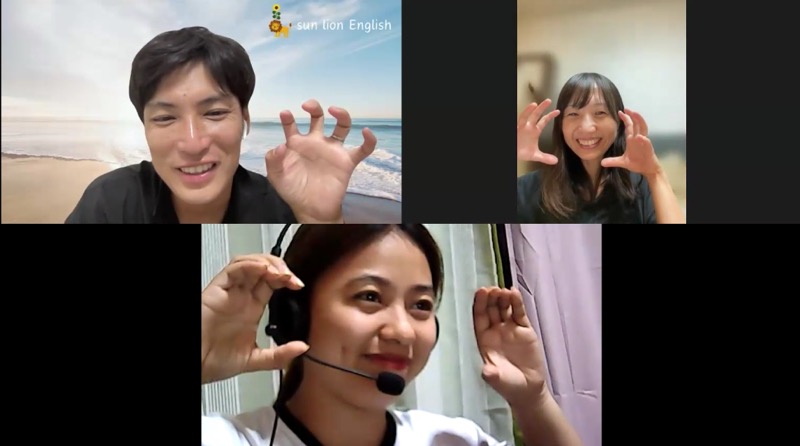
会場
zoom
クラス内容
「Japanを教えて🇯🇵」
単語・フレーズ
cheap / expensive
• 意味:cheap = 安い / expensive = 高い • 関連単語: • affordable = 手頃な値段 • pricey = 値段が高い(カジュアル) • 例文:This street food is cheap, but that restaurant is expensive.
(この屋台の食べ物は安いけど、あのレストランは高い)
• ポイント:「めっちゃ高い」は super expensive / very pricey と言える。
delicious / not delicious
• 意味:delicious = おいしい / not delicious = おいしくない • 関連単語: • tasty = おいしい • awful = まずい • 例文:This smoothie is delicious, but that one is not delicious.
(このスムージーはおいしいけど、あれはおいしくない)
• ポイント:「まずい」は “not tasty” や “awful” が自然。カジュアルに “really bad” でもOK。
halo-halo
• 意味:フィリピンの人気デザート「かき混ぜるもの」=ミックスデザート • 関連単語: • mix = 混ぜる • shaved ice = かき氷🍧 • 例文:Halo-halo is a famous Filipino dessert made with ice, fruits, and sweet beans.
(ハロハロは氷、フルーツ、甘い豆などで作る有名なフィリピンのデザートです)
• ポイント:日本の「ミニストップのハロハロ」はフィリピンから来た名前。英語でも halo-halo で通じる。
avocado fruit shake
• 意味:アボカドフルーツシェイク(アボカドを使った甘い飲み物) • 関連単語: • smoothie = スムージー • milkshake = ミルクシェイク • 例文:In the Philippines, avocado fruit shake is a very popular dessert drink.
(フィリピンではアボカドフルーツシェイクはとても人気のあるデザートドリンクです)
• ポイント:日本ではアボカドは「サラダや料理に使う野菜」と思われがちだが、フィリピンでは「甘いデザート」として楽しむのが特徴。
creamy and sweet
• 意味:クリーミーで甘い • 関連単語: • rich = 濃厚な • smooth = なめらかな • 例文:The shake tastes creamy and sweet because it is blended with milk and sugar.
(ミルクと砂糖を混ぜるので、そのシェイクはクリーミーで甘い味がします)
• ポイント:味の表現に便利。アボカドを使うと「濃厚さ」「まろやかさ」を表現できる。
2025年 8月26日(火)

会場
zoom
クラス内容
「ニュースでディスカッション🗽」
単語・フレーズ
I’m honestly too scared to ~
• 意味:正直すごく怖くて〜できない
• 関連単語:
• I’m too afraid to ~ = 怖すぎて〜できない
• terrified = めちゃくちゃ怖い
• 例文:I’m honestly too scared to watch ghost shows.
(正直怖すぎて心霊番組は見られない)
• ポイント:honestly を入れることで「本音で言うと…」というニュアンスになる。
peek through
• 意味:〜の隙間からこっそり見る • 関連単語: • glance = ちらっと見る • peek = のぞき見る • 例文:I always peek through my fingers when I watch scary shows.
(怖い番組を見る時は指の間からのぞく)
• ポイント:怖いときや隠れて見たいときによく使う日常表現。
I can’t resist
• 意味:我慢できない/抗えない • 関連単語: • irresistible = 抵抗できないほど魅力的 • can’t help (doing) = 〜せずにはいられない • 例文:It’s so scary, but I can’t resist watching.
(すごく怖いけど、見ずにはいられない)
• ポイント:ポジティブにもネガティブにも使える便利フレーズ。
block sunlight
• 意味:日光を遮る • 関連単語: • shade = 日陰にする • cover = 覆う • 例文:To grow tencha, farmers must block sunlight for three weeks.
(てん茶を育てるには、農家は3週間日光を遮らなければならない)
• ポイント:お茶の栽培方法だけでなく、植物の育成や環境説明でよく使える表現。
invest
• 意味:〜に投資する、お金をつぎ込む • 関連単語: • spend on = 〜にお金を使う • put money into = お金を入れる • 例文:He invested 1.4 million dollars in a big machine to dry the leaves.
(彼は葉を乾燥させる大きな機械に140万ドルを投資した)
• ポイント:ビジネスや農業、学習など幅広く使える。「投資する=未来のためにお金や時間をかける」イメージ。
2025年8月19日(火)
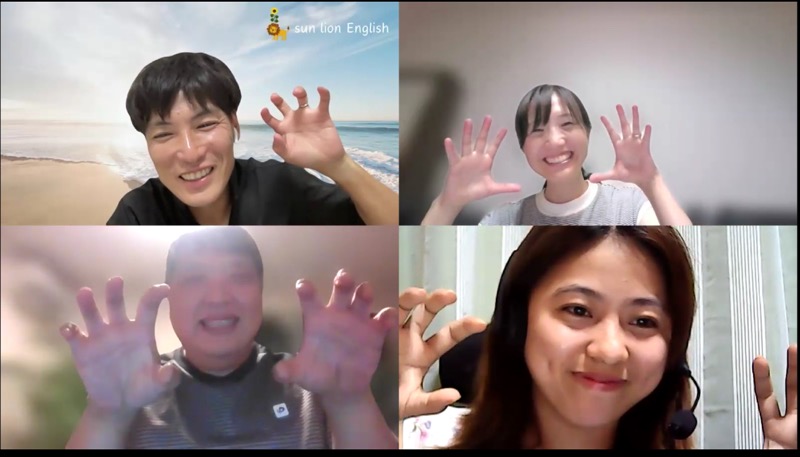
会場
zoom
クラス内容
「tell me about you☺️」
単語・フレーズ
Tech Trouble Expressions
•It seems my mic won’t work.
→ マイクが動かないみたい。
•I’m not tech savvy.
→ 機械に詳しくない。
•I’ll try to fix it.
→ 直してみるね。
In reality
• 意味:実際には、現実には
• 関連単語:
• actually = 実は
• in fact = 実際は
• 例文:In reality, I often make plans on my days off.
(実際は、休みの日に予定を入れてしまう)
• ポイント:理想と現実のギャップを言うときに便利
Honestly
• 意味:正直に言うと、本当のところ
• 関連単語:
• frankly = 率直に言えば
• to be honest = 正直言うと
• 例文:Honestly, I didn’t sleep.
(正直、寝てない)
• ポイント:“Really?”(本当に?)と混同しやすいが、意味は異なる。
Oba-san / Obaa-san
• 意味:
• oba-san = おばさん、叔母
• obaa-san = おばあさん、祖母
• 関連単語:
• ojisan = おじさん
• ojiisan = おじいさん
• 例文:My obaa-san lives in the countryside.
(私のおばあさんは田舎に住んでいる)
• ポイント:伸ばす棒(ー)があるかないかで意味が変わる。
You’re welcome
• Welcome / You’re welcome = どういたしまして
• It’s okay = いいよ、大丈夫
• Douitashimashite = You’re welcome
• I really like strawberries. = いちごが大好き
• Maji ichigo suki = カジュアルな言い方
💡 「ありがとう」に対する返事は You’re welcome 以外にも It’s okay や No problem がよく使われる。
2025年8月12日(火)
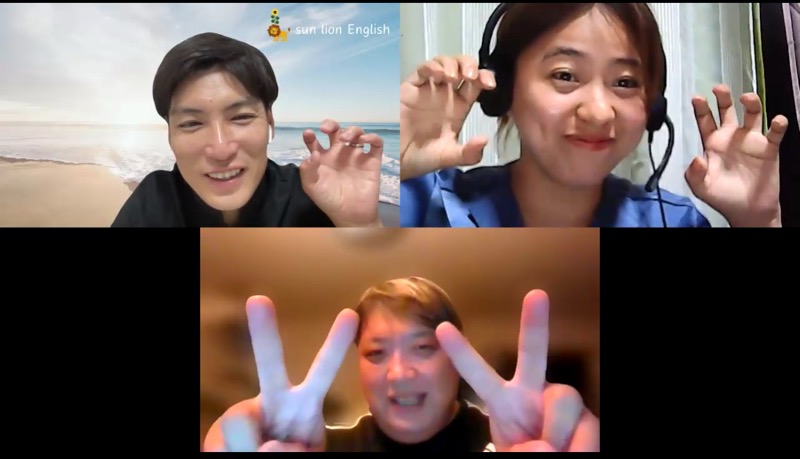
会場
zoom
クラス内容
「日記でディスカッション🥳」
単語・フレーズ
It’s a hassle
意味:めんどくさい
例文:Sorting garbage is such a hassle.(ゴミの分別は本当にめんどくさい)
I get it’s for the planet
意味:地球のためなのはわかってる
例文:I get it’s for the planet, but it’s still a hassle.(地球のためなのはわかるけど、それでも面倒だ)
ポイント:“I get it” は “I understand” よりカジュアル。
Obon
英語説明:Obon is Japan’s Buddhist festival for honoring ancestors, usually in mid-August. Families visit graves, offer incense, and enjoy summer festivals.
日本語:先祖を供養する仏教行事。お墓参りや盆踊りをする。
Sort different types of trash
意味:ゴミを種類別に分別する
関連単語:bio waste(生ごみ)、non-bio waste(不燃ごみ)、glass(ガラス)、plastic(プラスチック)、paper(紙)
Cebu Travel Tips
例文:Cebu Airport is one of the cleanest airports.
Lechon is very famous in Cebu, especially in Carcar.
補足:Lechon(レチョン)は皮がパリパリのローストポーク。
2025年8月5日(火)

会場
zoom
クラス内容
「日記でディスカッション🥳」
単語・フレーズ
“Luck forgot about me.”
意味:「運に見放された感じ」
冗談っぽく、自分に運がないと感じた時に。カジュアルでユーモアを交えた表現。
例:I lost my wallet, missed the train, and spilled coffee on myself. I think luck forgot about me today 😂
“Early to bed, early to rise.”
意味:「早寝早起き」
例:I’ve been feeling tired all the time. Maybe it’s time for early to bed, early to rise.
wrapper
意味:包むもの、皮(この文では「餃子の皮」)
例文:We made dumpling wrappers from flour.
roll out
意味:延ばす(特に麺棒などで平らにする)
例文:I rolled out the dumpling wrappers.
dumpling
意味:餃子(広く「小麦粉などの生地で具を包んだ料理」)
例文:I made dumplings with my Chinese friend.
[動]catch
意味:(魚などを)捕まえる、釣る
例文:We caught a fish called “kisu”.
kisu (Japanese whiting)
意味:キス(日本でよく釣れる白身魚)
例文:We caught a fish called “kisu” (Japanese whiting).
2025年7月29日(火)
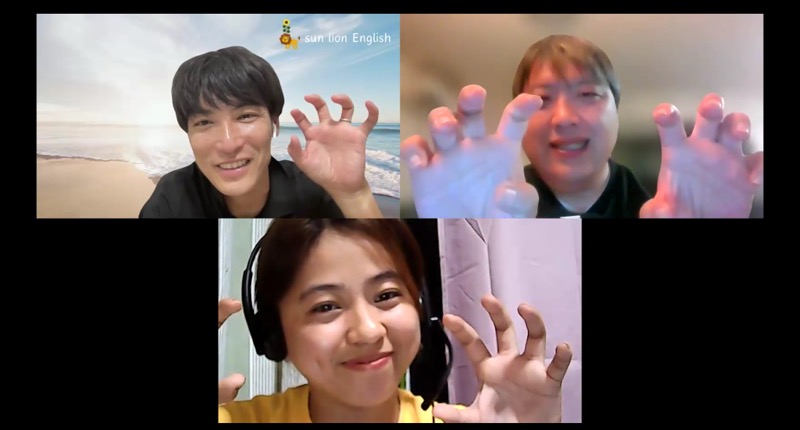
会場
zoom
クラス内容
「tell me about you☺️」
単語・フレーズ
I’m super into ~ / I’m so into ~
「~にめっちゃハマってる」
totally covered
「完全に覆った/たっぷりかけた」
例:I totally covered my pizza with chili.
chili / chilies
「チリ/唐辛子」
chili sauce
「チリソース」
My favorite way to eat (something) is…
「私の一番好きな食べ方は〜です」
例:My favorite way to eat them is to totally cover my pizza with chili.
2025年7月27日(日)
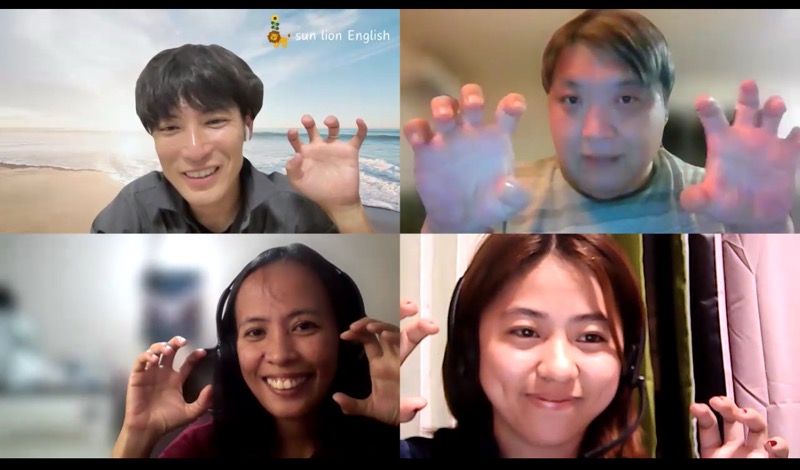
会場
zoom
クラス内容
「日記でディスカッション🥳」
単語・フレーズ
nothing big happend today
[フレーズ]何もない平和な一日
crunchy
[形](食べ物・雪など)カリカリ・ザクザク音をたてる
It’s like a maze.
迷路のような
Just when I was about to give up,
あきらめようとしたその時、
2025年7月24日(木)

会場
zoom
クラス内容
「Doフリートーク🍰」
単語・フレーズ
Gwapa
きれいな女性(ビサヤ語)
Maganda
美しい・きれい(ビサヤ語)
orphanage
[名]孤児院
broken spanish
片言のスペイン語
what do you find challenging about learning a new language?
新しい言語を学ぶ上で難しいと思うことは何ですか?
2025年7月22日(火)

会場
zoom
クラス内容
「ニュースでディスカッション🗽」
単語・フレーズ
North Pole Marathon
北極マラソン
get used to~
〜に慣れる
polar bear
ホッキョクグマ
How’s it going? /How’s ○○ going?
調子はどう?/○○はどう?
think outside the box
固定観念にとらわれずに考える
2025年7月15日(火)

会場
zoom
クラス内容
「日記でディスカッション🥳」
単語・フレーズ
Don’t think,Feel!
考えるな、感じろ
brother in laws
義理の兄弟
glutinous rice flour
もち米粉
share some life experiences
最近の出来事・感情を共有する
Aside from that, I’m also happy because they brought a special delicacy from their island, it’s the calamay.
それ以外にも、彼らが島の名物(手土産)であるカラマイを持ってきてくれたのも嬉しかったです。
specialty
名物、名産
It is made from glutinous rice flour, coconut milk, and sugar and it is traditionally packaged in polished empty coconut shell.
もち米粉、ココナッツミルク、砂糖から作られ、伝統的に磨かれたココナッツの空の殻に詰められています。
happy-meal
ハッピーセット🍟
I’m not making fun of you.
あなたをからかっているわけではありません。
2025年7月13日(日)
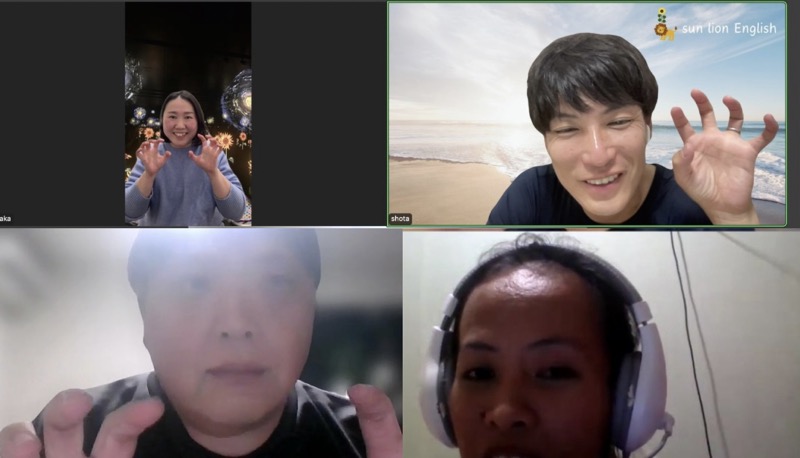
会場
zoom
クラス内容
「Japanを教えて🇯🇵」
単語・フレーズ
2025年7月10日(木)
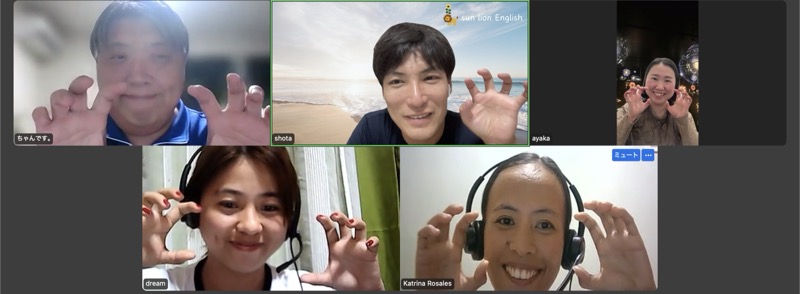
会場
zoom
クラス内容
「Doフリートーク🍰」
単語・フレーズ
crochet
[名]かぎ針編み、クローシェ編み[動]かぎ針で編む
My internet connection is not stable. Gomenasai
インターネット接続が安定しません。
I haven’t seen big one.
大きいのは見たことないです。
insect
[名]虫
2025年7月8日(火)

会場
zoom
クラス内容
「日記でディスカッション🥳」
単語・フレーズ
stink bug
[名]カメ虫
stinking
[形]悪臭を発する
gecko
[名]ヤモリ
I have no choice
仕方ない
instant
[名]瞬間、今すぐに[形]即時の
2025年7月5日(土)
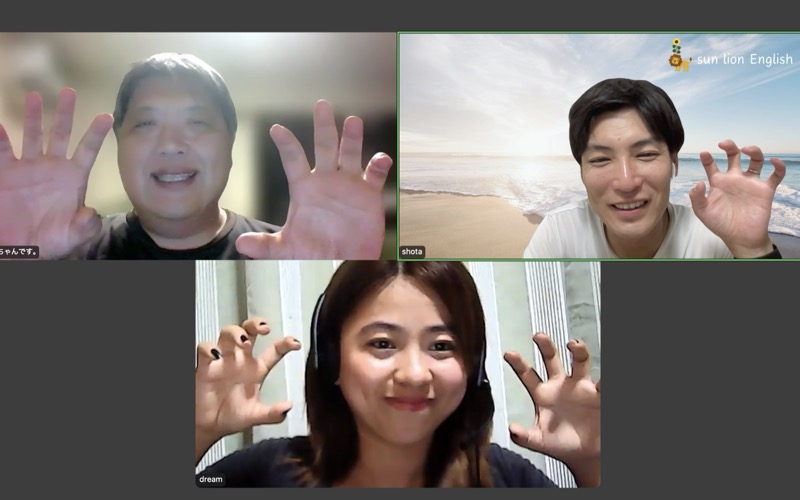
会場
zoom
クラス内容
「ハートフルスピーチ🥰」
単語・フレーズ
It gives me another shot at tomorrow.
明日にもう一度チャンスをくれる!
once a day
一日一回
laugh out loud
(Lol)声を出して笑う、爆笑する
You only live once
(YOLO)人生は一度きり
例:I bought the ticket to Paris,YOLO!(パリ行きのチケット買っちゃった。YOLO(人生一度きりだし!))
2025年7月1日(火)

会場
zoom
クラス内容
「日記でディスカッション🥳」
単語・フレーズ
I’m not really why?,I’m not sure why,I don’t know why
知らんけど(shirannkedo=dialect)、知りませんが(shirimasennga=formal)
dialect
方言
wrap it up = finish or completed
終わり、完了
My work today was a wrap.
I ended my day with a wrap.
chicken wing
手羽先
tinolang Isda
Tinolang Isda(ティノラング・イスダ)**は、フィリピンの家庭料理で、「魚のジンジャースープ」として知られるヘルシーであっさりとしたスープ料理です。
2025年6月25日(火)
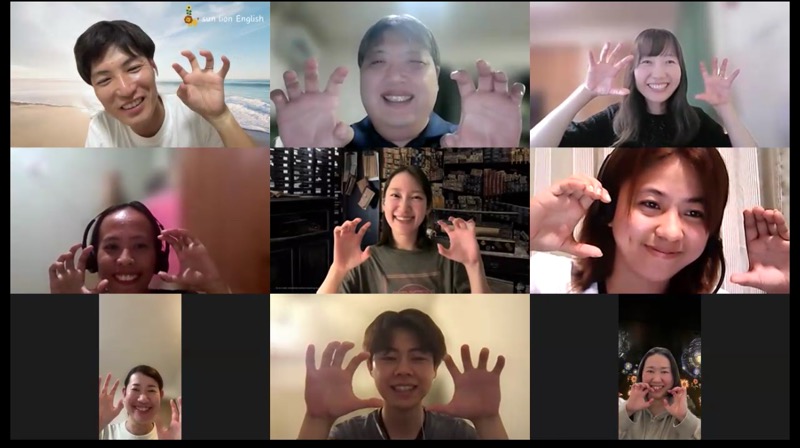
会場
zoom
クラス内容
「tell me about you☺️」
単語・フレーズ
My dogs are so loud I have to mute for a while.
うちの犬たちがうるさいので、しばらくミュートにしないといけません。
I still have a cough but I’m okay.
まだ咳は出ていますが、大丈夫です。
bay ducks or duckling
ducklings is like a group of ducks
during my free time- on my free time→instead of ” when I have time
